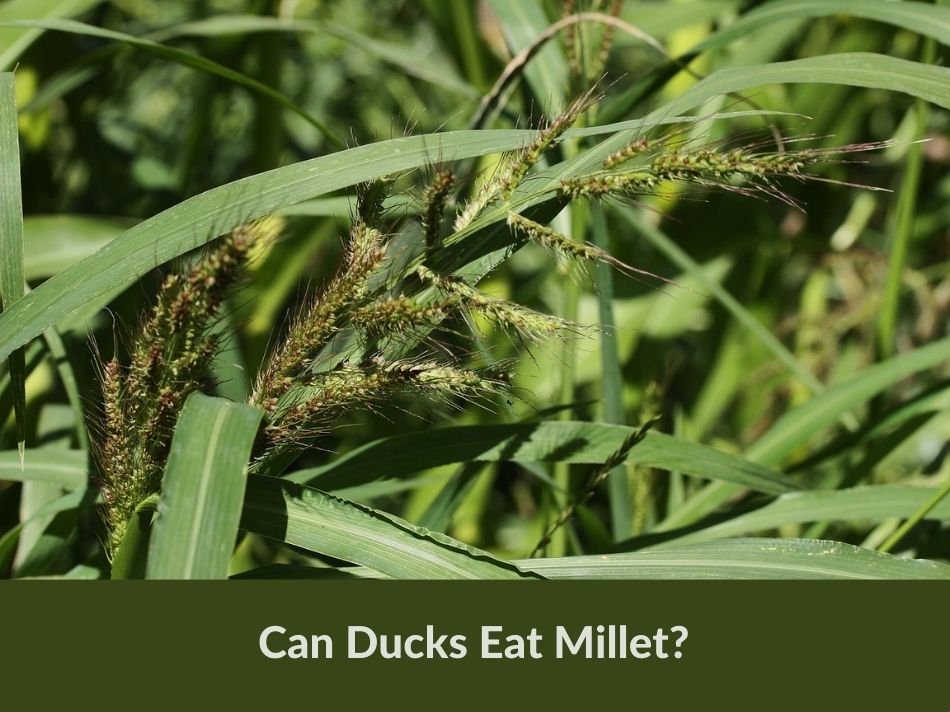Ducks are generally omnivorous creatures, happily nibbling on a variety of foods from grains and seeds to small insects and aquatic plants. A balanced diet usually includes a mix of grains, vegetables, and proteins to ensure they get the essential nutrients. But, can ducks eat millet?
Yes, ducks can indeed eat millet. Millet is a nutritious grain that can be a valuable part of a duck’s diet. It’s rich in carbohydrates, fiber, and essential nutrients. Like any food, it should be fed in moderation and as part of a balanced diet.
In this article, we’ll go in depth on the topic ducks eating millet, how often it should be fed, and its health benefits for both adult ducks and ducklings.
How Often Can I Feed My Ducks Millet?
Millet can be incorporated into your ducks’ daily feeding routine, but it should not make up more than 20-25% of their overall diet. Millet can be an excellent supplemental feed, especially if you are looking to diversify the grains in your ducks’ diet.
Just remember, ducks also require proteins, vitamins, and minerals from other food sources.
Can Ducklings Eat Millet?
Yes, ducklings can consume millet, but it’s crucial to grind it into a finer consistency for them. Their digestive systems are not as robust as adult ducks, and the smaller particles make it easier for them to digest.
It’s also important to monitor their intake, as ducklings require a balanced diet that is rich in protein for optimal growth.
Millet Nutritional Value
Below is the nutritional value of 100 grams of millet.
- Calories: 378
- Protein: 11 g
- Fat: 4.2 g
- Carbohydrate: 73 g
- Fiber: 8 g
It also contains several vitamins and minerals as listed below.
- Phosphorus
- Magnesium
- Folate
- Iron
Is Millet Healthy for Ducks?
Millet is quite healthy for ducks when fed in appropriate quantities.
- Phosphorus: Essential for bone formation and maintenance. It also aids in energy metabolism, making it important for muscle contraction and overall health.
- Magnesium: Vital for nerve function and muscle relaxation. A deficiency could lead to nervous and muscular issues, affecting the duck’s mobility.
- Folate: Important for cellular division and DNA synthesis. Crucial during periods of rapid growth and for egg development in laying ducks.
- Iron: A key component of hemoglobin, it helps in oxygen transport. Iron deficiency can lead to anemia, affecting a duck’s health and activity level.
How To Feed Millet To Ducks
- Preparation: Grind the millet: Grind the millet to a size that’s appropriate for the age and size of your ducks. For ducklings, a finer consistency is recommended.
- Portion Control: Limit the amount: Ensure that millet does not make up more than 20-25% of the ducks’ overall diet.
- Method 1: Scatter on Water: You can scatter the millet on the surface of the water in the pond or duck area.
- Method 2: Mix with Regular Feed: Mix millet into your ducks’ regular feed for added variety and nutrients.
- Water: Provide Fresh Water: Always have fresh, clean water available for ducks when feeding them millet or any other food. This aids in digestion and prevents choking hazards.
More Grains Ducks Can Eat
Besides millet, ducks can safely consume a variety of other grains as part of a balanced diet. Grains are a good source of energy and essential nutrients for ducks, making them an important part of their dietary needs. For those interested in diversifying the diet of their feathered friends, you may consider the following grains:
Curious about feeding ducks? Check out this guide for a variety of duck-friendly grains and seeds.
Conclusion
In summary, millet can be a nutritious and enjoyable addition to a duck’s diet. It’s particularly useful for duck caretakers looking to offer a balanced and diversified dietary plan. Just remember to follow the guidelines on portion control and always provide fresh water.
Disclaimer: The information in this article is for informational purposes only. I'm not an expert or a veterinarian.


